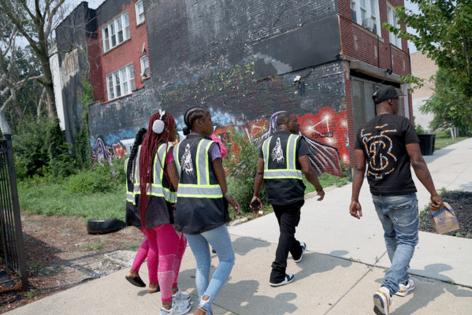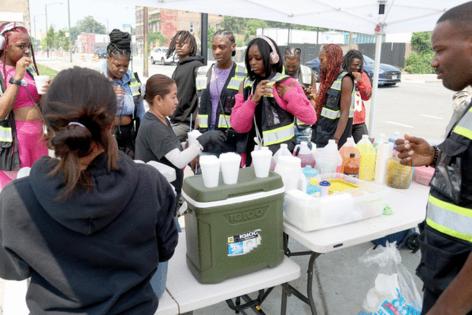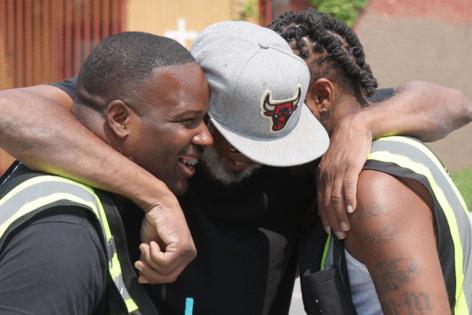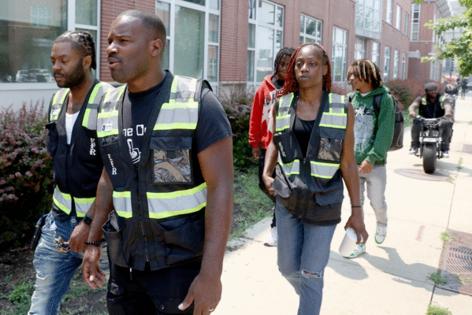After losing two anti-violence workers to gunfire, Chicago nonprofit persists: 'We have to be strong'
Published in News & Features
CHICAGO — There are days when Charles McKenzie wants to give up.
After his 1-month-old niece was shot in the head. Or when his friend was shot to death in the South Side neighborhood where they both grew up. Hours after celebrating his birthday earlier this summer, when he got the call that gunfire had killed someone else he considered family.
But he persists in hopes that one day, change will stick.
“I gotta keep running, keep running, keep running,” McKenzie said. “Until I can’t run no more.”
McKenzie, 36, is the founder of Englewood First Responders, a nonprofit organization primarily composed of at-risk youth and young adults that for six years now has worked to prevent and clamp down on violence in Englewood and other areas across the city — even as it faces the heartbreak of that violence head-on.
Since last summer, Englewood First Responders have had to mourn two of their own members who were killed by gunfire. But for those that remain, their work continues.
Despite insistence from the White House that Chicago is in need of a federal crime crackdown, efforts by both elected officials and people like McKenzie to prevent shootings and disrupt cycles of violence have been — and are — in force. The city is now well into its fourth consecutive year of declining violent crime. Through late August, Chicago had recorded 266 homicides in 2025, a 32% decline in killings from the same period in 2024, while total shooting incidents are down 36%.
That decline has been mirrored in the Chicago Police Department’s Englewood District, which also includes the Gage Park, Auburn Gresham, Chicago Lawn, Greater Grand Crossing and West Englewood neighborhoods. As of Aug. 24, the district had recorded 15 homicides, a drop of 50% from this time last year, according to Chicago police data. Shooting incidents in the district are down 34%.
From the same period four years ago, the decline is sharper, with homicides down 62% in the district from 2021 and shootings down 64%, police data shows.
McKenzie, in part, credits the change to Englewood First Responders, noting he and his team get calls “all through the night” these days to divert and de-escalate violence. But he’s intimately aware they have more to do. His grief alone is a daily reminder.
And as many strides as they’ve made, it’s the fear that he’ll “lose another one if I drop that ball” that has McKenzie staying the course.
The relationships that make violence interrupters’ work deeply felt is also what makes it effective, said Chico Tillmon, executive director of Community Violence Intervention Leadership Academy at the University of Chicago.
“It takes what we call relentless engagement,” Tillmon said. “It’s not going to happen in the first conversation. People have to know you really care about them, and it takes time and consistency.”
Last year, after five men working as peacekeepers were shot in separate shootings in the Little Village and North Lawndale neighborhoods — killing three — fellow outreach workers maintained that despite the risk, the anti-violence model is a long-term solution.
“People ask me, how do I cope with it?” McKenzie said. “I go out there and I continue to keep going … because if we stop, we let a lot of people down. So we have to be strong … and show that (there’s) people out here that (are) losing so many loved ones back to back, and they’re not giving up.”
A different path
Latanesha Thomas began working with Englewood First Responders when she was just 12 years old. Born and raised in Englewood, Thomas, now 17, said there’s no telling where she’d be if she wasn’t part of the nonprofit. It’s where she met her best friend, Meeyah Smith, or, as Thomas said, the “yin to my yang.”
Meeyah, 16, was shot and killed on the Fourth of July. She was at a large gathering with her family in Avalon Park when unknown assailants began shooting just before 11 p.m., according to a police report. Gunfire struck Meeyah in the throat and another victim, a 35-year-old man, in the leg, leaving four shell casings and three pools of blood, the report said. Meeyah was pronounced dead at Jackson Park Hospital & Medical Center. Her death was ruled a homicide by the Cook County medical examiner’s office.
Nearly two months later, there had been no arrests in connection to the shooting, according to Chicago police.
Thomas last saw Meeyah in person a few days before the shooting, though they texted each other every day in a group chat they shared with other friends from Englewood First Responders, including 17-year-old Jemya Hopkins, that she called “sisters.” Also introduced through Englewood First Responders, Hopkins said she and Meeyah “instantly clicked,” connecting over how alike they were, down to sharing the same astrological sign. (They were both Pisces, Hopkins said.)
Meeyah messaged in their sisters’ group chat the night she died, Hopkins said, who recalled “we were literally texting moments … before it happened.” They heard Meeyah had been shot and killed the next morning.
“My mind was everywhere,” Thomas said. “We literally had plans to go out (that) day. It’s like, we was just with you, how can you be gone so fast?”
Thomas rattled off adjectives to describe Meeyah: energetic, outgoing, smart, funny and genuine. She said Meeyah could walk into any room, or even a pitch-black tunnel, for that matter, and light up the space. She’ll miss Meeyah coming into Englewood First Responders’ headquarters at 838 W. Marquette Road “every single day yelling, ‘Bestie!’” she recalled.
Four days after the shooting, Thomas returned to work without her.
The 40 to 50 members of Englewood First Responders, who range in age from 11 to 38, focus their efforts on directly combating violence and general community outreach.
Beyond responding to crime scenes and conducting peace mediation circles, the group offers a host of services, from canvassing neighborhoods, hosting community events and handing out meals to providing wellness checks and transportation assistance to seniors, hosting after-school programs and even doing chores like shoveling snow, picking up trash and mowing lawns.
The operation is particularly centered around giving youth and young adults the opportunity to set themselves on a different, more positive path, McKenzie said. Younger members receive stipends every two weeks, made possible by donations, which is what primarily fund Englewood First Responders.
McKenzie, who grew up in Englewood, started the organization in 2019 to be “part of the solution” after once being “part of the problem,” he said. At age 15, someone gave him the chance to turn over a new leaf and it was then that he promised himself he’d create something to give younger generations the same opportunity.
But when stricken with a loss like Meeyah’s death, it can “make you feel like all (of) what you built, you gotta rebuild it again,” McKenzie said.
‘No whens, no ifs’
That July Fourth night, also McKenzie’s birthday, he had plans to celebrate downtown with his Englewood First Responders’ family. At the party, he recalled asking where Meeyah was and being told she was with her family but would come after. She never showed. He woke up early to the news that she had died.
“Just doing this work, (you) see these types of acts every single day … but when it hits home,” McKenzie said, “it really takes you to a level of, ‘Wow, what if I’m not doing enough?’”
McKenzie asked himself a similar question a year ago when his friend — someone who was like a brother to him and had worked with Englewood First Responders almost since the organization’s inception — was gunned down in an Englewood alleyway.
Dennis Green, 36, was fatally shot on June 9, 2024, in the 700 block of West 66th Place. Three days later, police arrested then-25-year-old Darien Mitchell, of Chicago, in connection to the shooting on allegations that he shot Green in the chest, groin and cheek from about a foot away while out on parole with prior felony convictions, according to Cook County court documents.
When police found Green, he was laying on the ground near a pool of blood and three shell casings, according to an incident report obtained by the Tribune through a Freedom of Information Act request. Green was transported to UChicago Medicine with six gunshot wounds, where he was pronounced dead 15 minutes after responding officers first arrived on scene.
Mitchell was indicted on six counts of murder, charges he has pleaded not guilty to as the case still remains active in Cook County Circuit Court.
Mario Butler met Green while playing basketball at Walter Reed Elementary School when they weren’t much older than 10 or 11 years old, Butler, now 36, said. They grew up together and eventually joined Englewood First Responders around the same time, Butler said, noting that like McKenzie, he once considered himself part of the problem before realizing he wanted something different for himself as he got older.
Butler remembers the morning he found out Green had been shot like it was yesterday, he said. Green was a rare real friend and losing him “felt like it took a piece of me,” Butler said.
Then he lost Meeyah, too.
“Meeyah, that was my baby,” he said. After she died, Butler couldn’t return to Englewood First Responders for days. What brought him back was knowing he still had a job to do, he said.
“I grew up around this, so when you know what you’re dealing with, it’s a surprise and it’s a shock, but it’s (also) not, because in my head, it’s not necessarily never a question of if, it’s always a question of when,” Butler said.
Ultimately, he wants “no whens, no ifs.”
“Every day,” Butler said, “I put myself in the middle of danger to stop the danger for everyone else.”
Bridging the gap
For McKenzie, it’s the Englewood First Responders’ younger members especially that pushes him to “keep the hope alive,” he said. “I tell them every single day, every single day, do something to make a difference for someone else.”
The differences can be small. On a near-daily basis, no matter if it’s raining, snowing, windy or humid, Englewood First Responders go on neighborhood patrols, members said. They have various routes, sometimes sticking to Englewood and other times going as far as the Loop, but the intent is just to remind the community that they’re around. That’s how they foster trust, which is instrumental to their work, McKenzie says.
“Even when (Chicago police) are out there trying to do their job, it can get hostile because you can have people going back and forth with (officers) … so we intervene,” McKenzie said, noting that Englewood First Responders strive to work hand in hand with CPD. “We bridge the gap between the police and the community.”
Law enforcement and anti-violence work are both part of the “community safety ecosystem,” Tillmon of the University of Chicago said. The difference, Tillmon said, is that whereas law enforcement is more responsive in nature, violence interrupters act before a situation breaches a level of crime.
“Say I was an individual (that) had a history of fighting people and (you upset me), you couldn’t call the police and say, ‘Hey, I upset Chico and he done have fights in the past, could you come up here and arrest him?’ … But you could call (violence intervention leaders).”
Most violence intervention work is also done when nothing has happened, Tillmon said. It takes being thoughtful about what a community needs — investment, beautification, culture shift — to get at the root of violence, he says. For that reason, Tillmon is skeptical of the idea of federal troops deploying to Chicago.
Over the past week, President Donald Trump has threatened to target Chicago next for a military occupation.
“If you’re not addressing none of the challenges that cause violence to erupt, then what are we doing? What’s the real purpose? It’s not (a) permanent solution, it’s a display of power more than anything,” Tillmon said, adding that “It’s a fear-based approach.”
“There are two ways to address a public health crisis: One is fear and one is love,” he said. “We know that fear don’t work.”
To McKenzie, there’s “nothing wrong” with help, he said, but he encouraged more funding to bolster the work already being done on the ground, rather than sending in troops.
“I believe that we are making some … damn good proactive steps to make a difference in our city,” he said.
On a humid afternoon in late July, McKenzie went on a patrol of Englewood with a small group of members, most ranging in age from 16 years old to their early 20s. Wearing neon yellow vests, they walked down sidewalks, stopped at street corners and hugged and said hello to people passing by. Among those was Darius Morton.
For a few minutes, the patrol stalled as McKenzie spoke to the 36-year-old Englewood native. Afterwards, as McKenzie returned to the group and the Englewood First Responders continued on with their canvassing, Morton watched them leave.
“It’s always good to see a good face,” Morton said.
Morton has known McKenzie since they were kids, but that afternoon was the first they’d seen each other in four years, he said. McKenzie’s work, though, hasn’t gone unnoticed.
“We both come from the same environment,” Morton said, “where it’s like either fight or flight. And he’s fought and he’s fought and he’s fought to (push the peace). … People seeing that, kids seeing that, they know that he fightin’. (So) we gonna fight.”
©2025 Chicago Tribune. Visit at chicagotribune.com. Distributed by Tribune Content Agency, LLC.














Comments